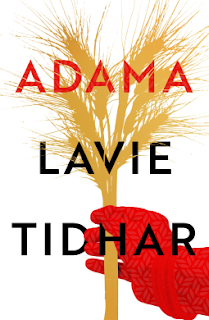Head of Zeus, 14 September 2023
Available as: HB, 391pp, audio, e
Source: Advance copy
ISBN(HB): 9781804543467
Available as: HB, 391pp, audio, e
Source: Advance copy
ISBN(HB): 9781804543467
I'm grateful to the publisher for sending me an advance copy of Adama to consider for review.
Following last year's Maror, and with some of the same characters and events referenced, Adama is another part of Lavie Tidhar's examination of the history of modern Israel. I'm impressed by just how productive Tidhar is - he's also exploring the mythological roots of England, having worked through Arthurian mythology and Robin Hood. Israel/ Palestine, it might be argued, has less mythology and more history to it, and certainly Maror/ Adama aren't fantastical in the way that By Force Alone and The Hood are, but I'd argue that decomposing mythology is EXACTLY what he is about here too. And he does it very effectively.
Adama is loosely focussed on Kibbutz Trashim, and we follow its history through the lives of several generations of members, beginning with Ruth in the years just before the founding of Israel and witnessing the country's birth in war and its development, alongside that of the community. The story is bookended by the death of Ruth's daughter, Esther, in Florida in the early 2000s and the discovery of heirlooms - photographs, trinkets - by her daughter Hanna. Hanna has no idea of their context or identity, although we will learn more in the course of the book. I did find this discovery of bits of a mother's life a powerful theme - my own mother died a few months ago and I so relate to this experience, this realisation that there was much one didn't know, and that now it's too late.
Ruth was, it becomes clear, an idealist, who travelled to Palestine to be part of the founding of her nation. And if that founding requires sacrifice, or casualties, whether Ruth's comrades, the kibbutz's Arab neighbours, or British soldiers, well. Ruth is later joined by her sister Shosh, who survived the Holocaust: for Shosh, Trashim - and Israel - are less a yearned for destination than a necessary (and perhaps temporary) refuge. This tension between those who belong - or want to belong - and those who want more, is a recurring theme, one that also runs through the kibbutz's generations of children. It's a sad theme, and time and again people are lost - they die, they vanish, they just leave. There's a stripping away across the generations with the communal life of the kibbutz repelling some and the hard-won community itself mutating into something its founders might not recognise.
Adama is not a book for the squeamish. It features the removal or killing of the kibbutz's Arab neighbours. It features war, with its attendant atrocities. In the later years, crime gangs feature: and like Maror, there's an issue about where they end, and where organs of the State begin. And, of course, it features scenes from and immediately after the Holocaust itself. Indeed another recurring motif is the camp - whether the Nazi extermination camps, the camps which housed displaced persons after the war, those established by the British for the Jews trying to reach Palestine, or - perhaps - later, Trashim itself and by extension, the entire country.
The scenes featuring refugees on leaky boats trying to cross the Mediterranean can't fail, I think, to evoke those now fleeing from South to North in the same waters - as can those where we see the Jewish inmates of the British camps in Palestine being deported to Cyprus. How little the world seems to have learned.
But the book isn't at all despairing. Told in fifteen parts, some of them fairly lengthy, self-contained (but linked) stories, as with the Hollywood film made on location in the fifties, often referenced after; some of them little vignettes - a group of children running away to find the sea, two mothers chatting and smoking outside the communal nursery while they wait to see their kids - Adama is like a tapestry, each new piece adding something to all the rest, giving us a gallery of believable characters and a host of storylines, some fully explored, some merely hinted at. And yes, as often in Tidhar's writing there are overtones in some of this of noir and references to pulp fiction including to stories of a 1940s Jewish detective.
For a book which is not in any sense a doorstop, Tidhar manages to pack Adama with so much. It teems with history, with life, with joy and sorrow, music and love, revenge, heartbreak, above all perhaps with that inevitable, universal process of losing by which what was dear and familiar to one generation becomes marginal to the second and incomprehensible to the third.
Overall an absorbing, thought-provoking book.
For more information about Adama, see the publisher's website here - and of course the other stops on the blogtour which you can see listed on the poster below.

No comments:
Post a Comment